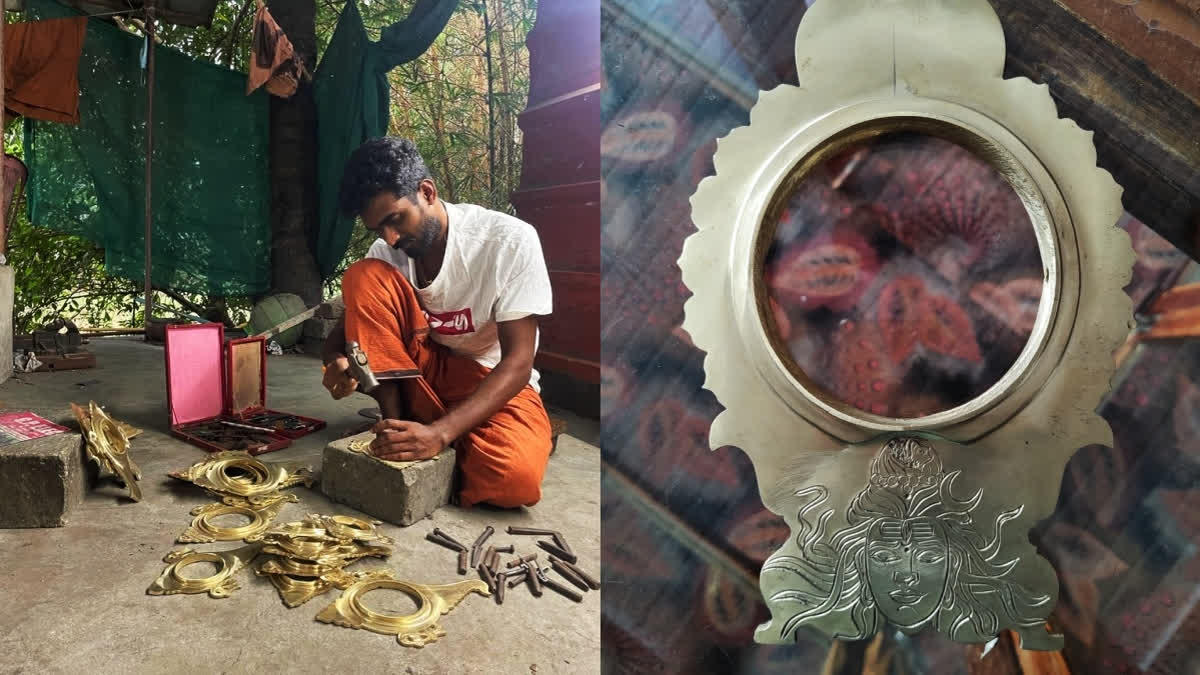Pathanamthitta (Kerala):The Aranmula Mirror, a metallurgical wonder and GI-protected centuries-old handicraft from Kerala, whose priced pieces adorn the British Museum and Buckingham Palace, is now under threat from the effects of climate change. The 2018 floods and the extreme rainfall events that continue to trouble Kerala have depleted a key raw material the clay from the river Pamba's basin used to create the casts that make the one-of-its-kind handicraft, say its craftsmen.
Known as the Aranmula Kannadi (mirror) in Malayalam, as it is a product of the temple town of Aranmula in Pathanamthitta district, the metal alloy mirror was given a geographical indication tag in 2004-2005 for its super exclusivity. Made by the finest craftsmen for generations, the unique product has been given on many occasions as a gift to heads of state visiting India by Indian authorities.
Prime Minister Narendra Modi, on his visit to the UK in November 2015, presented an Aranmula Kannadi to then British First Lady Samantha Cameron. But now the artisans who make the true-reflection mirror are finding it hard to source the clay with the requisite qualities, as the past few years' floods and landslides in the area have changed the chemical and physical properties of the soil in Aranmula Village. "The quality of the soil has changed after the 2018 floods.
Earlier, we used to take the topsoil from the fields to make the casts for the mirror. Now we have to dig deeper to get the soil that we require, and even that is of poor quality," Manoj S, who has been making Aranmula Mirrors for the past 20 years, told PTI.
Manoj and his family live in a house close to the river Pamba in Aranmula, where the mirror-making unit is also located. His house, a one-storied building, was completely submerged in water during the 2018 floods. "The floods have deposited huge amounts of silt on the soil, causing damage to the original soil here, which is essential for making Aranmula mirrors," Manoj said.
The Kerala Soil Survey Department also confirms the changes in the chemical and physical properties of the soil in flood-affected areas of Kerala. "Our study after the 2018 floods in 13 districts has identified significant changes in soil quality. The quality of the soil in the Pamba basin, where Aranmula is located, has deteriorated significantly," V Justin, Assistant Director, Soil Survey Department, Pathanamthitta, told PTI. Extreme rain events can worsen the situation, he adds.
Topsoil erosion and silt deposits during flash floods could cause a major problem in areas like Aranmula. If these areas get flooded again, more silt will get deposited and contaminants could further alter the soil characteristics, he said. "Large quantities of sand, silt, and clay were seen deposited on the surface soils of the affected panchayats. The thickness of deposition varied from 2cm to 10cm. Soil crusting was also reported from these depositional areas," the study titled, 'Soil Health Status of Kerala in Post Flood Scenario' said.
